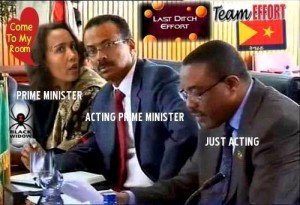Ethiopia: Power scramble after premier’s death puts fragile state on the edge
By Juma Kwayera
Aug 26, 2012, Nairobi (Standard) — Governing Ethiopia People’s Revolutionary and Democratic Front (EPRDF) faces an uncertain future following the death of Prime Minister Meles Zenawi.
Ethnicity, as ever, is going to determine who takes over the reins of power.
A week after Zenawi’s death was made public, the scramble for power has intensified with the members of the politburo of EPRDF said to be slugging it out, pointing to an imminent political turbulence or even a falling out.
At the centre of the ensuing power struggle is acting Prime Minister Hailemariam Desalegn, his predecessor at the Foreign ministry and ambassador to China Seyoum Mesfin and Zenawi’s widow Azeb Mesfin, who had been tearing into each other long before the fallen Prime Minister became indisposed.
There are also prominent political figures in the governing party Zenawi had suppressed as he maintained a stronghold on power.
Smooth transition
Although the Mr Desalegn’s ascent to power last week was almost smooth, political embers have been smouldering in Zenawi’s faction of the EPRDF, the Tigrayan People’s Liberation Front (TPLF), which has also seen Berhane Gabrecriticos, Dr Towdros Andenhom, Neway Gebraan and Azeb Mesfin, all members of the governing politburo, join the fray to succeed Zenawi.
The other political parties that make up EPRDF are: Oromo People’s Democratic Organisation (OPDO), Ahmara National Democratic Movement (ANDM) and The Southern Nations, Nationalities and Peoples’ (SNNP) party. ANDM and OPDO are the majority, while SNNP is a recent addition to the coalition.
Zenawi’s widow, Mesfin, who is a member of the executive committee of the TPLF contested and won a parliamentary seat in the north during the controversial 2010 elections as means of positioning herself to succeed her husband.
Zenawi’s succession has always been a thorny issue. According to Dr Ododa Opiyo, infighting in Zenawi’s government had on several occasions threatened to bring the regime down as number of disgruntled allies grew.
Dr Opiyo, an expert on Horn of African conflicts and politics, says even before he died, Zenawi had often worried about ouster.
“During this period, Zenawi was not only the chief executive officer of administration, but was the law of the courts; he would make his wishes on the law of the land in a matter of hours. His type of leadership intimidated any opposition in Ethiopia. At the same time, the leadership from the ruling party; the Ethiopian Peoples’ Revolutionary Democratic, remained fearful of the reprisals Zenawi would mete out on internal opposition,” says Dr Opiyo, currently on secondment to the African Union Mission in Somalia (Amisom).
Endless infighting
To illustrate just how infighting has always been intense, Opiyo points to how Zenawi had managed to pummel opposition in his party into total submission.
As an example of how the fallen PM would not brook challenge, Opiyo says: “Zenawi’s former Defence minister Seeye Abraha and his former close confidant, who planned the Eritrea-Ethiopia war was jailed for six years for non-existing charges of corruption. When prime Minister Zenawi realised that Foreign minister Mesfin was becoming too strong and a possible successor, he demoted him and posted him to China as an ambassador.”
Such was Ethiopian leadership that the exit of Zenawi has opened a new front to serious competition for power, which might also see opposition seek to reclaim their position in the country’s political realm.
Zenawi’s leadership was oppressive and intimidating, which is why Ethiopia’s allies in the West are worried that he has left a fragile country, one likely to crumble and face internal fighting. Ethiopia is an important player in international war on terrorism and Indian Ocean piracy.
Dr Mohammed Ali, an expert of on Ethiopian politics since the ouster of dictator Mengistu Haile Mariam, says the power struggle in TPLF is expected to determine if the governing EDPRF coalition will still hold after Zenawi’s death. He says his widow will be key to the succession battle.
“She can push and shove as she is highly energetic. Whatever happens is expected to give the opposition an opportunity to enter the fray. At present, the opposition is quiet as it has been clamped down under the Terrorism Act in the same manner the media has been trampled upon,” says Dr Ali.
An American Congressman had told The Standard On Sunday in an interview that the Prime Minister’s demise would present a leadership challenge to eastern Africa’s most populous nation.
“The fact of the matter is Ethiopia is relatively stable politically and economically. Ethiopia is not an easy country to rule. Ethiopia has also been an important regional player under the leadership of the former Prime Minister. Ethiopian peacekeeping forces played key role shortly after the Rwandan genocide. In Sudan, Ethiopia is an important player,” said the Congressman, who requested anonymity lest his views are perceived as those the Government of the congressional committee on Ethiopia he sits on.
Under the EPRDF regime, opposition and media were suppressed. Popular musician like Teddy Afrah has spent spells in detention on trumped up charges of murder, while a former High Court judge Birtukan Mideksa was detained in controversial circumstances. Birtukan’s decision to join a political party to help bring political change and the rule of law landed her in detention, from which she was released last year.





Comments
Post a Comment